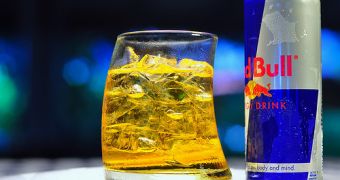A new study found that energy drinks don't really give you wings, or at least not when you mix them with alcohol.
Many people believe that if they mix alcohol and energy drinks, the caffeine will counter the sedating effects of alcohol and increase vigilance and stamina.
But researchers from the Boston University School of Public Health [BUSPH] and the Center for Alcohol and Addiction Studies at Brown University, conducted a study that concluded otherwise.
It actually seems that mixing caffeine to alcohol (like Red Bull and whiskey for example) has no effect whatsoever on increasing performance on a driving test, or on enhancing sustained attention or reaction times.
For this new study, the researchers recruited 129 participants, aged 21 to 30 years old, and randomly assigned them to four groups.
The first group drank caffeinated beer, the second one consumed non-caffeinated beer, a third group drank caffeinated non-alcoholic beer and the fourth had non-caffeinated, non-alcoholic beer.
The participants receiving alcohol reached an average blood alcohol level of 0.12g%, a bit more than the legal limit for getting behind the wheel.
Half an hour after drinking, the participants were tested on a driving simulator and on a sustained attention/reaction time test.
The results showed that caffeine does not lessen the impairment effects of alcohol, because on the driving tests, the effect of alcohol on performance was noticeable, but the addition of energy drinks did not make a significant difference.
As for the sustained attention and reaction times test, the addition of caffeine made only a slight difference, which the researchers qualified as 'borderline significant.'
They say that “there appears to be little or no protective benefit from the addition of caffeine to alcohol, with respect to the safe execution of activities that require sustained attention with rapid, accurate decisions.
“The results of this study suggest that public education, via media and warning labels, should be considered regarding the safety of CABs [caffeinated alcoholic beverages], and that regulators should scrutinize energy drink and CAB advertising as it relates to promoting safety-related expectancies.”
Jonathan Howland, professor of community health sciences at BUSPH is the leader of this study, that comes in a time when the government increases scrutiny of energy drinks, especially when mixed with alcohol.
Denmark has even banned the sale of energy drinks, and the Canadian and Swedish governments have issued warnings about mixing energy drinks with alcohol.
Howland and his co-authors warn that even though the energy drink companies do not explicitly advertise that their products should be mixed with alcohol, “non-traditional youth-oriented marketing strategies” suggest that such drinks will “enhance attention, endurance, performance, weight loss, and fun, while reducing performance decrements from fatigue or alcohol.”
The professor summed up the study results and said that “it is important that drinkers understand that adding caffeine to alcohol does not enhance safety.”
This study is also the first that gives “a controlled evaluation of the acute effects of caffeine on driving impairment” after drinking to intoxication levels, he added.
The research was approved by the institutional review boards of Boston Medical Center, Brown University and the University of Michigan, and it will be published in the February edition of the journal Addiction.
Watch the video of Professor Howland discussing the study:

 14 DAY TRIAL //
14 DAY TRIAL //